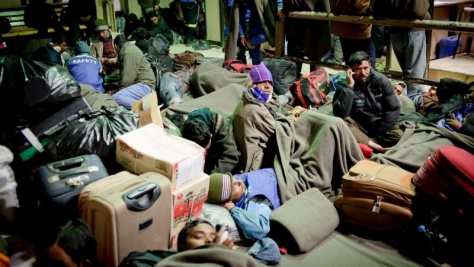UN missions find displacement, looming shortages on both sides of the battle lines in Libya
This is a summary of what was said by UNHCR spokesperson Adrian Edwards – to whom quoted text may be attributed – at today's press briefing at the Palais des Nations in Geneva.
UNHCR staff visited conflict zones south and east of the Libyan capital Tripoli last week and found significant displacement, widespread violence and an urgent need to support Libyan organizations in providing basic supplies and services.
UNHCR participated in two inter-agency missions - the first to Tripoli and displacement sites in government controlled areas near the Misrata frontline (Zlitan and Al Khums) and the Nafusa Mountain front-line area of Gharian; the second mission was to the opposition-controlled city of Misrata. The teams saw both sides of the battle lines as well as efforts to maintain support for those affected by the conflict. The mission also heard reports of partiality in the delivery of assistance. We could not verify these reports.
The mission to Zlitan, al Khums and Gharian was coordinated with the Libyan government and government personnel accompanied us. Nevertheless UNHCR and UN staff were able to speak relatively freely with some groups of people. The government has primary responsibility to respond to the needs of an estimated 49,000 displaced people in the Tripoli/Zlitan region.
Displaced people that UNHCR met seem to be coping, albeit under difficult circumstances. Most are housed in hotels, dormitories and seaside homes. They are being provided with assistance by the Government and some private charities. However, an aid crisis could be looming. Despite the fact that warehouses are currently well stocked with basic food items it is apparent that the combined impact of protracted conflict and sanctions are eroding the government's ability to effectively deliver assistance. The view of the inter-agency mission was that If this situation continues, international aid is likely to be needed in a matter of weeks.
In Tripoli itself, long queues for petrol (the mission measured one at 8.2 kilometres long) are affecting normal life. Shortages of essential items combined with sustained conflict are increasing stress levels for the population.
On the other side of the battle lines, and in Misrata, the inter-agency mission met members of the Misrata Transitional Council. UNHCR was told that there are around 25,000 displaced people in the city, representing approximately 5000 families. Most are staying with host families and relatives, while others are staying in schools and unoccupied new buildings. In many cases Libyans are hosting up to seven or eight displaced families in their homes - a situation that is almost certainly unsustainable. People have not received salaries since January and banks are not operational.
Several entities in Misrata, including the Libyan Committee for Humanitarian Relief, local businesses and engineering companies are exploring ways to quickly provide accommodation for these displaced people. UNHCR is also ready to support the rebuilding of homes. We are also continuing to deliver regular relief by boat from Benghazi to Misrata through local partners.
While in Misrata, UNHCR staff spoke to several people who reported kidnappings in the city and its surroundings. Local relief agencies and human rights groups in Misrata estimate that at least 1,000 people, mainly men, have been kidnapped or have disappeared since the conflict started in February. A woman told UNHCR that her three brothers-in-law were abducted. The two who were later freed said they had been taken to a government camp in Zlitan where they had to pledge allegiance before being trained and forced to fight on the government side.
Life is slowly picking up in Misrata, with youth cleaning up the streets, and shops re-opening. But according to the Misrata Transitional Council, the city is facing food and medicine shortages. Since the beginning of the war, 630 people have been registered dead in the five hospitals of the city while 6,000 people have been injured, including by unexploded ordinance. Some 80 per cent of the nurses in hospitals - who were mainly foreigners - left the city early on in the crisis. They have been progressively replaced by medical students. Electricity has only been restored recently to some parts of the city.
For further information on this topic, please contact:
- In Tunisia: Firas Kayal on mobile +216 508 561 99
- Helene Caux on mobile: +216 928 27 423 or +41 79 217 31 93
- Andrej Mahecic (on mission) mobile +41 79 200 7617
- In Geneva: Sybella Wilkes on mobile +41 79 557 91 38
Related news and stories
AU, EU and UN push for urgent action to address the pressing needs of migrants and refugees in Libya
Insecurity and COVID-19 fuel refugee mental health concerns in Libya
Repaired Benghazi home brings comfort after loss and displacement
Libya: Returning Home in Dignity
Refugee women scale Atlas mountain to tackle gender violence
Libya: First evacuation flight to Niger in over a year brings 172 asylum-seekers to safety
Your search for « libya » matched 2133 results. Only the first 1,000 results are displayed. Displaying page 1 of 112 pages.
-
Libya
... An estimated 1.3 million people are in need of humanitarian assistance in Libya. Hundreds of ... Our overall objective in Libya is to improve protection and life-saving assistance to displaced ...... -

Leaving Libya. A review of UNHCR's emergency operation in Tunisia and Egypt, 2011-2012. Guido Ambroso, Mike Collyer, Angela Li Rosi
Apr 2013 ... AND EVALUATION SERVICE (PDES) Leaving Libya A review of UNHCR’s emergency operation in ... which followed the outbreak of civil war in Libya, addressed one of the largest mixed migration ...... -

Libyans flee fighting in west into Tunisia
19 Apr 2011 ... UNHCR is seeing a growing number of Libyan refugees arriving in Tunisia from Libya's Western Mountains regions. This past weekend, some 6,000 Libyan nationals arrived in the Dehiba area of southern ...... -

Invisible refugees: protecting Sahrawis and Palestinians displaced by the 2011 Libyan uprising. Elena Fiddian-Qasmiyet
8 Nov 2011 ... and Palestinians displaced by the 2011 Libyan uprising Elena Fiddian-Qasmiyeh Refugee ... Eastern refugee populations (Sahrawis and Palestinians) affected by the 2011 conflict in Libya. ...... -

UNHCR Expanded Response in Libya Supplementary Appeal - January - December 2017
May 2017 ... Supplementary Appeal January- December 2017 MAY 2017 EXPANDED RESPONSE IN LIBYA 2017 SUPPLEMENTARY APPEAL > EXPANDED RESPONSE IN LIBYA 2 UNHCR /May, 2017 COVER PHOTOGRAPH: © UNHCR/I. Pavicevic. ...... -

Mixed Migration Trends in Libya: Changing Dynamics and Protection Challenges
3 Jul 2017 ... Mixed Migration Trends in Libya: Changing Dynamics and Protection Challenges Evolution of the Journey and Situations of Refugees and Migrants in Southern Libya Acknowledgements This report was ...... -
QIPs
... Around 1.3 million people are in need of humanitarian assistance in Libya. Many endure difficult ... people (IDPs), people returning home to Libya (returnees), and host communities by ...... -

Hundreds of Libyan Berbers flee Western Mountains and head to Tunisia
12 Apr 2011 ... GENEVA, April 12 (UNHCR) - The UN refugee agency reported Tuesday that more than 500 Libyans, mostly ethnic Berbers, have fled their homes in Libya's Western Mountains and sought shelter in the Dehiba ...... -

Fighting in eastern Libya leaves thousands internally displaced
22 Mar 2011 ... SALLUM, Egypt, March 22 (UNHCR) - Fighting in eastern Libya between pro-government and opposition forces has left thousands of Libyans internally displaced in recent days. Libyans arriving at Egypt's ......
